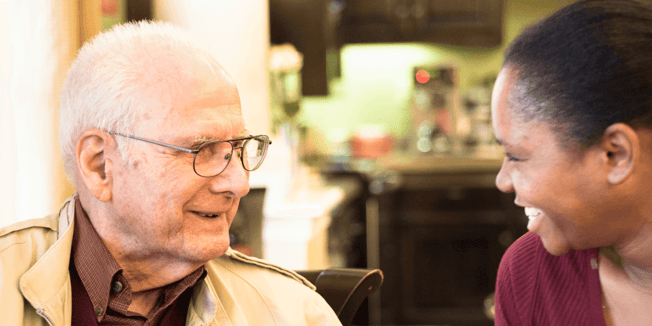Why Dementia Care is Beneficial for Alzheimer’s Patients
Wiki Article
Discover Compassionate Memory Care: Enhancing Lifestyle for Loved Ones
The journey of caring for an enjoyed one with cognitive disabilities provides unique obstacles that can exceptionally impact family members dynamics and emotional health. Thoughtful memory care facilities use a structured, helpful setting designed to resolve these obstacles while improving the quality of life for citizens. By concentrating on individualized care and purposeful involvement, these facilities not just uplift those influenced by conditions like Alzheimer's and dementia however also offer satisfaction for families. As we explore the important elements of caring memory care, it comes to be clear that recognizing these alternatives can make a significant difference in the lives of all involved.
Recognizing Memory Care
Understanding memory care includes acknowledging the customized assistance and services developed to assist people with cognitive impairments, such as Alzheimer's condition and various other forms of mental deterioration. Memory care centers concentrate on developing a secure and structured setting that advertises the well-being of locals while addressing their unique cognitive challenges.Key elements of memory care include educated personnel who are experienced about the intricacies of dementia and associated disorders. These specialists employ evidence-based practices to enhance cognitive function and maintain self-respect with embellished care strategies. The physical environment is likewise customized to decrease confusion and advertise experience, frequently featuring protected locations to avoid wandering. Boutique Memory Care Charlotte.Moreover, memory care highlights social involvement and meaningful activities that stimulate cognitive capacities and foster connections amongst residents. This technique acknowledges the value of maintaining social communications to fight seclusion commonly experienced by individuals with memory loss.Families play a necessary role in memory care, as their participation assists produce a helpful network that enhances the lives of locals. By recognizing the specific nature of memory care, families can make informed choices to improve the lifestyle for their enjoyed ones encountering cognitive disabilitiesKey Features of Compassionate Care
Caring care in memory care settings is identified by a holistic strategy that focuses on the emotional and emotional health of locals. Key attributes of this technique include embellished care plans customized per citizen's special requirements, preferences, and life background. This personalization promotes a feeling of identity and belonging, which is necessary for those experiencing cognitive decline.Another essential function is the visibility of experienced team who are not just competent in dementia care yet additionally thoughtful and compassionate. These caregivers engage in purposeful communications, using techniques such as recognition therapy to get in touch with homeowners and lower feelings of aggravation or anxiety.Additionally, compassionate care atmospheres prioritize sensory excitement and therapeutic tasks that reverberate with citizens' interests. This might include art treatment, music sessions, and reminiscence tasks, all developed to boost cognitive function and psychological connection.Furthermore, family members participation is motivated, permitting liked ones to take part in care activities and sustain their family participant's psychological requirements. Inevitably, the key functions of thoughtful care create a setting where residents really feel secure, valued, and understood, substantially improving their high quality of life.Advantages for Residents and Households

Tasks That Foster Involvement
Purposeful activities play a vital function in cultivating involvement amongst residents in memory care settings. These activities not only stimulate cognitive function however likewise advertise social communication, psychological wellness, and a feeling of objective. Customized programs that take into consideration homeowners' passions and capacities are necessary for taking full advantage of involvement and enjoyment.Creative quests, such as painting, crafting, or music therapy, encourage self-expression and can evoke pleasant memories. Structured exercise sessions, consisting of chair yoga exercise or strolling teams, improve physical health and wellness while supplying chances for socialization. Additionally, reminiscence treatment, which entails reviewing previous experiences and notable life events, can strengthen connections in between citizens and caregivers.Incorporating interactive games, puzzles, and even horticulture can additionally promote cognitive engagement and foster teamwork amongst citizens. Consistently set up team activities, such as movie evenings or themed celebrations, produce a sense of area, enabling locals to build relationships and share experiences.Ultimately, the application of varied tasks customized to specific choices is important in memory care. By promoting engagement via significant programs, facilities can substantially improve the lifestyle for citizens, ensuring they really feel valued and attached within their area.Picking the Right Memory Care Center
Selecting a memory care facility entails cautious factor to consider of various aspects that affect the wellness of citizens. Begin by assessing the center's total setting, see this website making certain it is secure, welcoming, and developed to minimize complication. Search for rooms that encourage social communication while supplying personal privacy for personal reflection.Next, evaluate the qualifications and training of the team. Taking care of people with memory impairments needs specialized knowledge. Validate that team member obtain continuous training in dementia care and use compassionate interaction techniques.Additionally, consider the series of services provided, such as customized care plans, therapeutic tasks, and assistance for member of the family. A facility that emphasizes all natural care can considerably enhance the lifestyle for residents.Visit prospective centers to observe communications in between team and citizens, and inquire about their approach to involving those with memory obstacles. Examine reviews and seek referrals from healthcare experts or regional assistance groups.Lastly, consider the center's area and access for household gos to, as regular call can boost citizens' psychological well-being. By taking these aspects into account, you can make a knowledgeable decision that ideal supports your liked one's requirements.Frequently Asked Inquiries
What Credentials Do Memory Care Staff Usually Have?
Memory care personnel typically hold credentials that include specialized training in mental deterioration and Alzheimer's care, as well as qualifications in first aid and mouth-to-mouth resuscitation. Lots of have backgrounds in nursing or community service, offering them with crucial skills in client analysis and psychological assistance. Alzheimer’s Care. Additionally, recurring education and learning in behavioral monitoring methods and interaction strategies is common, making certain team continue to be proficient at addressing the one-of-a-kind requirements of individuals with cognitive problems while cultivating an encouraging atmosphereJust How Can Households Join Their Family member's Care?

What Is the Price Variety for Memory Care Providers?
The price range for memory care solutions can differ significantly based on factors such as place, facility services, and degree of care required. Typically, households might expect to pay between $4,000 and $8,000 per month. Added solutions, specialized programs, and exclusive holiday accommodations can additionally affect rates. Alzheimer’s Care. It is recommended for families to thoroughly study and go to facilities to understand what is consisted of in the costs and check out monetary help options offeredExist Particular Dietary Options Available for Homeowners?
Yes, many memory care facilities provide tailored dietary alternatives to fulfill the specific nutritional requirements of homeowners. These choices typically think about numerous nutritional restrictions, such as diabetic issues, heart health and wellness, or allergies. Facilities frequently utilize qualified dietitians to produce dish plans that advertise general health while considering specific choices. Furthermore, member of the family are normally urged to take part in discussions pertaining to dietary selections to assure that their enjoyed ones' preferences and needs are respected.Exactly How Are Emergency Situations Handled in Memory Care Facilities?
Emergencies in memory care centers are handled through developed procedures designed to guarantee resident safety and quick response. Staff are educated in emergency situation procedures, including emergency treatment and emptying plans - Memory Care Charlotte. Facilities conduct regular drills to get ready for numerous scenarios, such as medical emergency situations, fires, or natural catastrophes. In addition, interaction systems remain in location to sharp staff and emergency services without delay, ensuring that residents get immediate attention and care throughout essential scenariosReport this wiki page